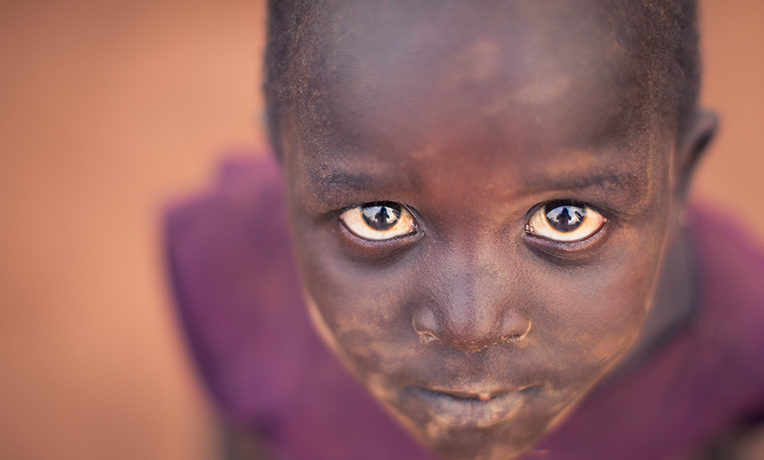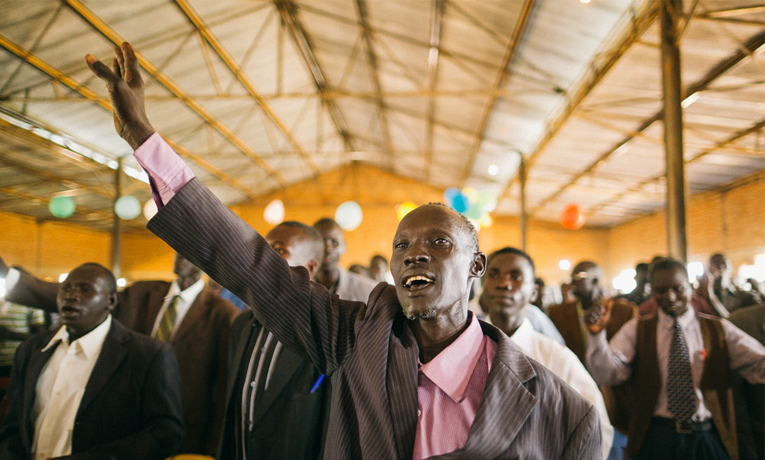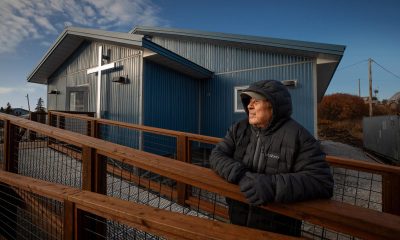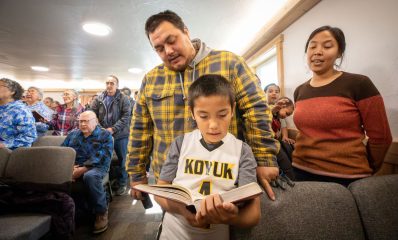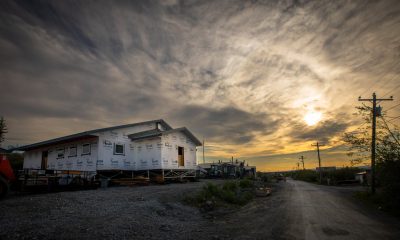God receives thanksgiving and praise at a special service to mark the end of a program to restore houses of worship in South Sudan
Hundreds gathered at the Akuem Cathedral in South Sudan’s Northern Bahr el Ghazal State on Sunday to celebrate and thank God for the rebuilding of more than 500 churches destroyed as a result of a brutal, two-decades-long civil war.
GiveA total of 512 churches were built under the Church Reconstruction Program, a partnership between Samaritan’s Purse and local congregations that began in 2005. Church members worked hard to gather raw materials and form bricks or cement blocks, which often took a period of several months. They also fashioned doors and windows. Samaritan’s Purse designed the structures; supplied steel trusses, roofs, benches, and pulpits; and helped with construction.“A rebuilt church represents bringing the hope of Christ back to these areas after war,” said Bishop James Lagos Alexander of the African Inland Church. “It’s not just a church being built, it’s a restoration of hope, a restoration of Christian dignity, and a restoration of our commitment to the Lord.”
The majority of the churches were constructed in what is now South Sudan, both before and after it gained independence in July 2011, including 91 in Northern Bahr el Ghazal. About a third were built in the Nuba Mountains region of Sudan, all while Sudan and South Sudan were still one nation.
Life Was Horrible
The Akuem Cathedral can hold approximately 1,000 worshippers, making it one of the largest of the new churches. Its history also made for a compelling reason to hold the celebration there.
Before the 2005 comprehensive peace agreement, Islamic militias from the north came multiple times into the region to raid cattle, burn villages, destroy churches, steal young children to rear as their own, conscript older boys for their forces, and murder pastors. Church planter William Deng, who shepherded flocks in Akuem village and nearby areas for many years, can still point out the tree near the spot where two young men and an older man were killed by aerial bombs as pro-Khartoum forces terrorized the region during the 2001 dry season. The tree stands less than 200 yards from the new church.
“Life was horrible,” Deng said. “When we saw the churches burning we thought it was the end of times like the Bible describes.”
The original church was first burned in 1992 (before Deng arrived) and the people used temporary shelters to worship in until 2011. That’s when Deng heard his congregation qualified for the Church Reconstruction Program.
“When we heard Samaritan’s Purse was coming to build the church we were so happy,” Deng said. “We had felt like no one was supporting us.”
More Work to Be Done
During the celebration event filled with prayer and song, Samaritan’s Purse staff member Scott Hughett, a project leader in its early years, recounted some history behind the work.
“In 2005, I received a message from [Samaritan’s Purse President] Franklin Graham,” Hughett said. “He told me, God has put a burden on my heart to rebuild the churches that have been destroyed. When I think back, I didn’t think it was possible. There were so many problems. But with God all things are possible.
“The program was not successful because of the resources brought by Samaritan’s Purse, but because of the spirit, the enthusiasm, and the work of the church [here]. It was a partnership.”
Hughett also read a letter from Graham in which he thanked the Lord for the churches of South Sudan and the fruit their work is bearing. Graham emphasized the importance of the Gospel and offered a prayer asking God to strengthen the churches in order that they can continue to build on the rock of His salvation.
Denominational representatives from South Sudan as well as Samaritan’s Purse staff touched on many of these same topics in a series of encouraging messages addressed to those gathered for this historic event.
Bishop Anthony Poggo of the Episcopal Church of Sudan thanked Samaritan’s Purse supporters worldwide for their partnership in the project.
“In addition to building these physical buildings, you have helped us build the lives of the people, the church of God,” he said.
Representing the Sudan Council of Churches, Bishop Michael Taban of the Sudan Pentecostal Church, gave thanks to the Almighty and then pointed to the church’s unfinished work of missions, evangelism, and discipleship in Sudan and South Sudan.
Edward Densham, Samaritan’s Purse Director of International Projects, picked up on that theme.
“Why did God have these churches built in South Sudan? Why did God keep the churches strong during persecution?” Densham asked. “Please remember that He has planted you to bring glory and honor to His Name. This is only the beginning; this is not the end. If God has given you one church, go and make five. The churches that have been built are tools for God’s glory, and God wants you use to use these to reach everyone in South Sudan for Christ.”
Densham concluded by asking for prayer for the people of the Nuba Mountains who remain under attack by their own government.
Samaritan’s Purse continues to support the churches and people of South Sudan through a variety of programs.
The vast majority of South Sudanese cannot read, and local church leaders have identified discipleship as an issue of pressing concern. The Bible Leadership and Discipleship (BILD) Program aims to address both of these problems.
Our staff trains men and women how to teach basic literacy (using the local Dinka language). Those trained then teach 25 others in their home churches during an intense four-month course. Upon completion, participants receive a New Testament in their language.
The BILD program also instructs trainers, selected by local congregations, to teach a four-month discipleship course. Similar to the literacy focus, these trainers return to their home churches to offer four months of Bible training.
Samaritan’s Purse also remains committed to meeting the pressing physical needs of those suffering in South Sudan through our feeding, nutrition, water, sanitation, hygiene, and agriculture projects based in Northern Bahr el Ghazal and Yida. We also run a hospital in remote Maban County.
